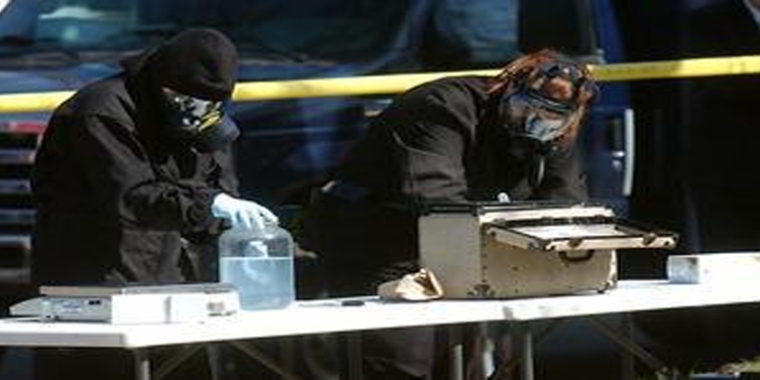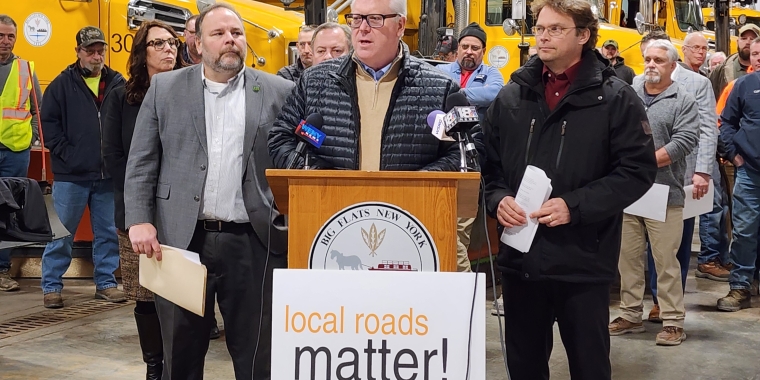
O’Mara legislation targets meth crimes: Harsher penalties for repeat offenders, cooking meth in the presence of a child, and meth lab explosions and fires
April 12, 2021
-
ISSUE:
- Methamphetamine

Elmira, N.Y., April 12—Following last week’s enactment of the 2021-2022 New York State budget, state legislators now move into the second half of their annual legislative session and State Senator Tom O’Mara is staking out several priorities including the enactment of legislation he has introduced targeting methamphetamine-related crimes locally and across New York State by significantly increasing the criminal penalties for manufacturing, selling, and possessing the illegal and highly addictive drug.
One piece of legislation (S5440) focuses on meth labs. It would increase the criminal penalties for the possession of meth manufacturing material and the unlawful manufacture of meth, implementing a series of increasingly severe felony offenses.
“Meth labs pose unacceptable risks to our neighborhoods, as well as roadsides and wooded areas where children and others can be exposed to the hazardous and toxic residues of these labs. They threaten the safety of police officers and first responders, and the public at large,” said O’Mara. “We need tougher laws against these dangerous and irresponsible meth cookers who have no regard for the health and safety of the rest of us.”
A related measure (S5504) O’Mara sponsors targets one of the worst dangers associated with clandestine meth labs: explosions and fires. The legislation calls for adding the crime of first degree arson, a Class A-1 felony punishable by up to 20 years in prison, to the list of charges that could be leveled against a meth cooker who causes a fire or an explosion that damages property or injures another person.
There have been a number of incidents of meth lab explosions and fires throughout the past decade in Corning, Elmira, Elmira Heights, Hornell, and other areas, O’Mara said. He pointed to the 2011 death of a 20-year-old Elmira woman, Kanisha Wood, in a meth lab fire in a rural cabin in Baldwin.
The crime of arson currently only covers intentional acts. Since explosions and fires involving meth labs are considered unintentional “accidents,” cookers cannot be charged under New York’s arson statutes.
O’Mara believes they should be.
O’Mara said, “Explosions and fires caused by meth labs have caused death, injuries, and extensive property damage across the Southern Tier and Finger Lakes regions. The hazardous and toxic chemicals associated with these labs pose unacceptable risks to our neighborhoods and the public at large, as well as to the safety of police officers, firefighters, and other first responders. Our laws need to be as tough and as thorough as they can possibly be to try to deter and punish the irresponsible meth cookers who have no regard for the health and safety of the rest of us.”
O’Mara is also sponsoring legislation (S5500) to increase the criminal penalties for the possession and/or sale of the drug by implementing an increasingly severe set of felony offenses. If enacted into law, state penalties in response to meth would be brought more in line with the penalties for possessing and selling cocaine and heroin.
The Senate has given strong, bipartisan support to some of O’Mara’s meth proposals in the past, however the measures were always stalled in the Democrat-controlled Assembly.
O’Mara has consistently highlighted the meth-related arrests and other incidents that have continued to plague the Southern Tier and Finger Lakes regions as the impetus for imposing stricter criminal penalties for possessing the material to make or for manufacturing the dangerous and highly addictive drug.
At a meeting of the city of Hornell Board of Public Safety earlier this year, Hornell Police Chief Ted Murray continued to highlight the spike of methamphetamine use in recent years. Murray reported that meth arrests rose from 17 in 2018 to nearly 80 in 2019, or approaching half of the city’s drug arrests. If not for the COVID-19 pandemic that curtailed law enforcement, that figure for meth would have likely remained the same in 2020, Murray added.
Murray said, “If you look at the type of drugs, 2019 and 2020 look almost identical in terms of the types of drugs we’re dealing with…Methamphetamine seems to be the drug of choice we’ve been dealing with throughout 2020, and that was the same in 2019.”
The legislation O’Mara sponsors include a provision making it a Class A-1 felony, punishable by a maximum sentence of 20 years in prison, for criminals convicted of operating a meth lab for the second time in five years. Currently that Class B felony carries a maximum prison sentence of nine years. The legislation also establishes the crime of manufacturing meth in the presence of a child under the age of 16 as a Class B felony. The possession of methamphetamine manufacturing material in the first degree would increase from a Class E to a Class D felony, punishable by up to two-and-a-half years in prison.
O’Mara said, “The byproducts of meth-related activity are addiction, broken families, crime, tragic deaths, and violence. They increasingly burden local systems of health care, criminal justice, and social services. Awareness and education, prevention and treatment are fundamental responses. But so are tougher laws and criminal penalties.”
Share this Article or Press Release
Newsroom
Go to Newsroom


